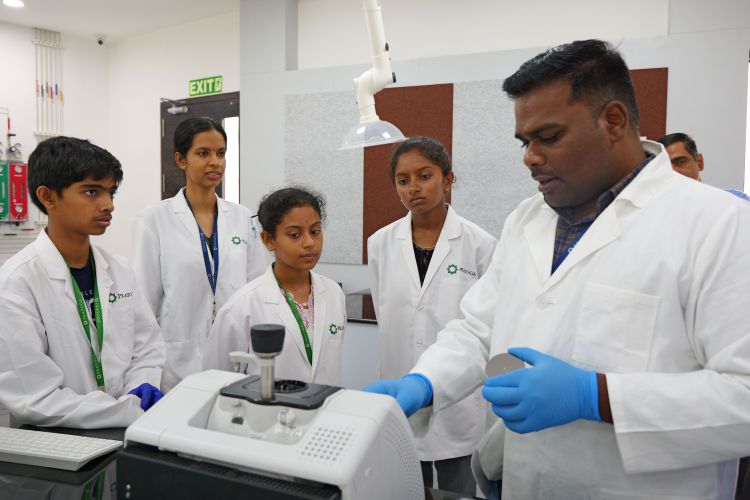Students’ research shows that everyday receipts may carry hidden health risks

The student researchers with Dr Anand at the Prayoga lab testing the thermal bill samples..
Team L&M
The next time you pick up a supermarket or ATM receipt, you might also be picking up chemicals that can quietly harm your health. This recent research done by three school students, R Usha (Grade 10, Sai Krushna Vidya Mandir School, Hosadoddi Village, Bengaluru), Aniketh V Bhat (Grade 10, Rashtrotthana Vidya Kendra, Banashankari, Bengaluru), and R Nalini (Grade 9, Sai Krushna Vidya Mandir School, Hosadoddi Village, Bengaluru), came up with alarming results.
The study was carried out at Prayoga Institute of Education Research as part of its Anveshana Student Research Program. It was guided by Principal Investigator Dr Athavan Anand and Co-PI Asha CH. The study establishes the existence of toxic chemicals like Bisphenol S (BPS) and Diphenyl Sulfone (DPS) in the thermal bill paper. Thermal bill paper is a commonly used item handled by millions, on a daily basis.
BPS is harmful
Bisphenol S is often used as a substitute for Bisphenol A, a chemical now eliminated from most consumer goods. This is because it has endocrine-disrupting effect and can cause multiple health disorders. These chemicals were detected in thermal paper, a material commodity commonly used to print receipts at stores, bus stops, toll booths, and ATMs. These chemicals can potentially pass into the human body through contact with skin and remain for hours. It can even impact the heart, hormones and nervous system and may even cause cancer. Although viewed as safer, recent findings worldwide show that BPS is likely to cause similar harm. This is because upon application of heat from the printer, it reacts with the dye to form text. Since BPS is not chemically fixed to the paper, it readily transfers to skin and into the body when handled.
The process of research
In this project, both printed and unprinted thermal papers were tested with different solvents to extract thir chemical composition. The analysis confirmed the presence of harmful compounds such as BPS and DPS. Unprinted thermal paper was purchased from a local stationery store in Bengaluru. It was then cut into uniform squares (1×1 cm) to ensure consistency. Printed bills were collected from sources, including ATMs, supermarkets, bus tickets, electricity bills, and vegetable vendors.
Various solvents such as hexane, petroleum ether, ethanol, chloroform, ethyl acetate, methanol, and water were tested with thin-layer chromatography used to identify the widest extraction range. Extractions were carried out from five grams of thermal paper samples to compare the chemical profile of printed bills with the unprinted ones.
This analysis revealed BPS and, surprisingly, DPS. To find out what these chemicals do in the body, the researchers employed SwissADME, a computational software. This method can predict solubility and permeability through cell membranes, and penetration of the blood-brain barrier.
The compounds’ toxicity was also determined by testing with water fleas (Daphnia pulex). It is an environmentally responsive aquatic organism, commonly used in environmental studies. Tests resulted in drastic declines in its heart rate, while higher concentrations resulted in death within 24 hours. These are clear indications of major potential effects from extended or repeated exposure. The results point to a possible mass public health issue, especially for those who touch receipts daily – e.g., bus conductors, and cashiers.
Alternative solutions
Dr. S. Athavan says that opting for e-bills in the form of email or SMS is an easy and environment-friendly step to minimise exposure. “Prayoga aims to extend this study by examining other everyday products with potential chemical risks and exploring sustainable alternatives to thermal paper,” he says.
This research, released as a pre-print on bioRxiv, opens the door to innovative solutions. One promising direction is the use of innovative, safer technologies such as vitamin C–based ink, already being adopted in institutions like the Yale University Library (USA). In addition to sustained student participation in hands-on research, the ultimate long-term vision is to contribute toward creating awareness in the public and influencing policy advocacy for the shift toward healthier and more environmentally friendly alternatives in daily transactions.
“Before this project, I never thought that the small receipts we get in shops could be harmful. When we tested the thermal bill papers, I was surprised to know that chemicals like BPA are present in them. I now realise how easily we touch receipts every day without knowing the risks. This project makes me think more critically about the things I use daily,” says Usha.
“The significance of our findings lies in uncovering how everyday items, such as shopping receipts, can expose people to harmful chemicals like bisphenol derivatives,” adds Dr. Athavan.

